Quaker Pacifism: A Better Way to Engage in Conflict
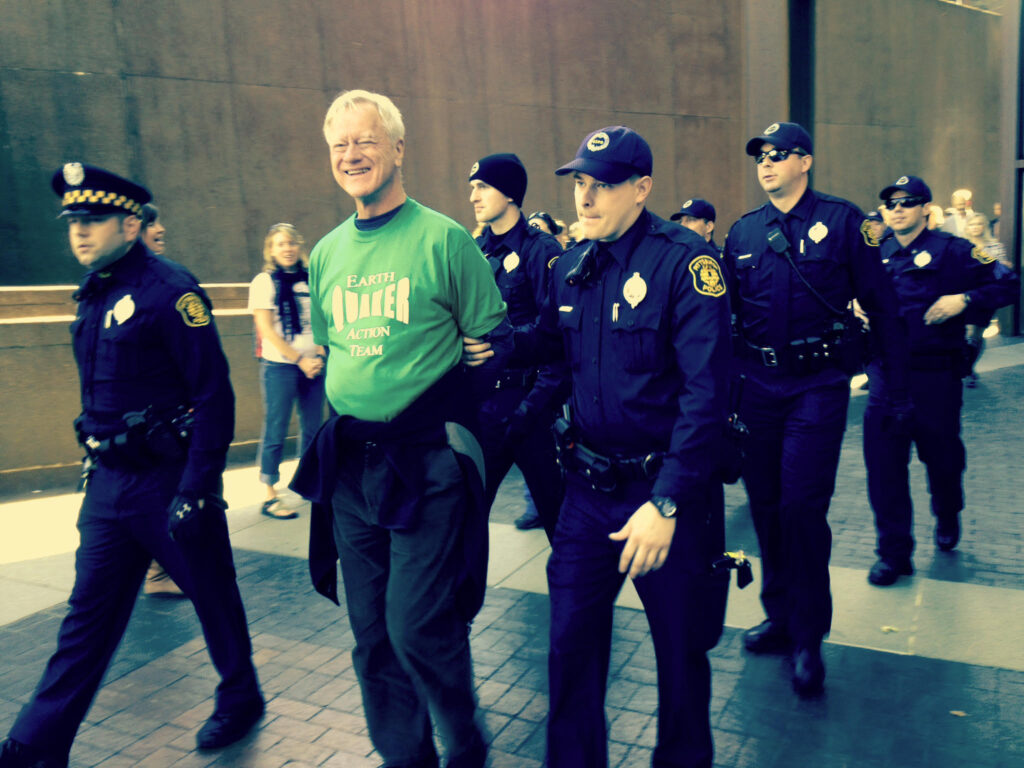
George Lakey is a well known Quaker pacifist, but he didn’t grow up that way. In fact, it wasn’t until George became involved with Quakers that he came to believe in the power of nonviolence.
Now in his 80s, George has spent most of his life as an advocate for social change through nonviolent direct action. In fact, he wrote the book on it. In this episode, he shares his deep conviction that pacifism is the way forward, even in an age of troubling conflict and polarization. We asked George about his lifetime of nonviolent activism, and why Quakers are pacifists.
Subscribe so you don’t miss an episode!
Leave a comment below to share your thoughts on this episode.
Download the transcript and discussion questions.
Discussion questions
- George ties his work to that of the first Quakers when he says, “We felt that it was true to our prophetic tradition…to have the kind of rebel group that was doing nonviolent direct action.” Do you agree with his connection of nonviolent direct action to that work of early Quakers? Why or why not?
- Although you might not sail a boat through contested waters, how can you practice nonviolence in your life?
Georgia
Hello everyone. It’s Georgia here. The show will begin in mere seconds, but first I wanted to ask for your help to reach our goal of 30 new podcast supporters by the end of June. It’s already May, so time is ticking.
As you know, this podcast is listener supported, and that means we really need you.
If you are a regular listener and you are excited by the work that we’ve been doing, please consider becoming one of the 30 listeners who helps us meet this goal. We are working on so many great stories and rolling out a few exclusive perks that will go to our monthly supporters.
It’s easy to sign up to become a supporter. You can just go to QuakerPodcast.com and click on the button that says support. Thanks so much. Here’s the show.
George Lakey
So I was making the rounds in my college town of of churches, and on the list was a Quaker one in West Chester, Pennsylvania. And so when they came to the top of the list, I went to the Quaker one, and I was mystified by all the silence that was going on. And they had an extraordinarily loud clock. So if you were wondering if the minutes were passing? Yes, indeed they were. And it all seemed very eccentric, and yet somewhat touching in a way. It touched a bit of my, my heart.
And my mind tended to go a mile a minute in those days.Then it was very hard to quiet it, you know. So I don’t, I don’t think I got much praying done. But I did get some sense that there’s something here that I want to know more about. So I think I’ll come back. And then on the way out, though, I saw on the bulletin board, there was an announcement that we should all be writing our congresspeople and urging them to not have the military draft. And I thought, Oh, that’s right. Somewhere I heard that Quakers are pacifists. Well, that’s crazy.
Various
Thee Quaker Podcast. Story, spirit, sound.
Jon Watts
I’m Jon Watts
Georgia Sparling
and I’m Georgia Sparling.
Jon
What’s up Georgia?
Georgia
You know nothing much. We’re just hitting the muggy season down here in Mississippi.
Jon
Oh yeah. Have you seen any alligator sightings recently?
Georgia
Oh yeah. They’re back. They out of hibernation and they’re in the water where I kayak.
Jon
Really? So you’ve seen a lot recently?
Georgia
I saw one this past weekend. It was a small one though.
Jon
So I don’t actually have a segway from alligators into our current episode.
Georgia
I can’t imagine why not.
Jon
So this season we chose to focus our flagship episode on Bayard Rustin, a behind-the-scenes architect of the Civil Rights Movement who was also a Quaker. To prepare for that episode, Georgia, you spoke with a lot of Quakers who were around and active during the Civil Rights Movement, and even some who knew Bayard Rustin.
Georgia
Yeah. This is true. They had so many incredible stories and it was really great to learn about it from people who were actually there.
Jon
Right and one of the folks you spoke with is our old friend George Lakey. George is a well-known Quaker activist. He has published a number of books, starting with the Manual for Direct Action, which was written in 1965 during the Civil Rights Movement, and more recently How We Win, which is based on the same material and updated for the 21st century.
George has been arrested many times, first for civil rights and more recently for climate justice. He is a visionary for social change and just the deepest believer in the effectiveness of nonviolent resistance. George is a sociologist and has studied nonviolent social change and taught classes on the topic at Swarthmore College. On top of all of that, he is one of the most joyful, gentle people I have ever met.
Georgia
Yeah I remember during my interview with him that I’d asked him this question and he said that it made him sweat but I never would have known that it caused him any discomfort because he was just so happy and laughing during our whole talk.
Jon
Right. his laugh is infectious. So recently, George has increasingly been focused on social division and living through polarized times which is feeling increasingly relevant. So anyway, this is all to say we thought George Lakey might deserve his own episode.
So last month, I visited George’s house in West Philadelphia to sit down for a conversation.
(Door bell rings)
George
Fancy seeing you you here.
Jon
George Lakey
George
Hello. Hello.
Jon
So in preparation for my conversations with George, I looked back through other interviews I’ve done with him. Several have been published on Youtube, and I realized we started doing this well before I could consider myself a professional videographer or media creator or anything.
I was looking back and I wanted to show you. Here are the 3 videos that we’ve published together. And together, those three videos have about 50,000 views.
George
Oh my gosh. Whoa, whoa.
Jon
I was also looking back to see how long we have been doing this together, you and I, and I found this photo from February of 2013.
George
Woah
Jon
And that was before I even started the QuakerSpeak project. That was for the pilot of QuakerSpeak. And I was using flip cameras and lights.
George
Oh, that’s a decade. That’s over a decade.
Jon
You and I have been doing this for over a decade.
George
Yes, how splendid. I love the continuity. I’m very, very lucky in my life. I have so much continuity with so many people.
Jon
Well, and that’s all to say, you know, we’re here. Here’s a new medium for us to explore. And I’m really excited to have this longer form conversation with you.
George
Usually they’re short, right? Because you’re shrinking into something format that needs to be brief.
Jon
That’s right, we get to we get to be spacious.
George
I like spacious.
Jon
Me too.
George
I grew up evangelical, and accepted Jesus in my heart at age 12. And took that extremely seriously, still do. So I had no idea what a Quaker was except there’s something about silence I’d heard. And I was brought up in a pretty noisy church. And everybody felt more satisfied, the more noisy it was. So it was quite a contrast in my college days when I ran into Quakers, and I was one of those proverbial ones that you hear about sitting there waiting for the service to begin.
And I found it charming and it got my curiosity going. It really got my curiosity going. So I went back and went back repeatedly. I did hear that Quakers tended to be pacifists. And so that was a stumbling block for me. And that took me quite a while. It took me a year of intense study and reflection to make my peace with peace. Because I’d been I’d lost an uncle in World War II and my dad was a fighter who was a you know, a soldier in World War II and all that. So it was it was quite a big thing for me and became and the peace testimony became, of course, central to my ministry through all these years, partly because I think that because of my not taking it for granted at all, but the reverse, struggling against it, I kept, I kept looking for ways out.
I even read the major American Marxist theoretician on why, you know, violent revolution, we have to have that in our back pocket. And we really need the ability to do war, when we, you know, we really need that ability. And so, you know, I was really reaching for a good solid argument against pacifism, and pacifism won. And that has remained basic to me today, even though I’ve been threatened with a knife and I’ve been beaten up a few times and all that. It just really stood me in good stead.
Jon
When George Lakey was a boy in the late 1950s, he had a unique opportunity to deliver a sermon for his church.
George
Well, at age 12, I was thought to be unusually articulate. I was very articulate. Sometimes my teachers thought I needed to learn to shut up. And so the elders in my church thought this boy might have this makings of a boy preacher because I was in that wing of the evangelical church where occasionally, there would be a boy preacher who would become famous and travel from church to church giving sermons.
So they said, George, we’re gonna give you a chance, see what you can do. I was thrilled. I was just thrilled. And so I worked very hard on my sermon. And I got up on Sunday morning, and the church was full, and everybody’s looking expectant. And I preached that it was God’s will, that there’ll be racial equality. That was the end of my preaching career. At least as a boy preacher. I do get to preach in a Quaker church once a while now. But yeah, that was that was the end of that. But you know, boy, that boy will be the death of us yet. Now he wants racial equality.
Jon
So, of course, George went on as a young man to feel drawn to the Civil Rights Movement.
George
Well, so I had that head start to pay attention. What are Black people doing about this outrageous situation we’ve got here? And so when the Montgomery Bus Boycott happened in ’56, I was just blown away. That was the year I went to college. I was totally open system.
But then one, a copycat movement started near Philadelphia in a town called Chester, Pennsylvania on the Delaware River, which was a city actually, where there was, which was rife with segregation, racial segregation. And so there were reports in the newspaper every day about the exciting marches, nonviolent marches and the jailings, and so on.
And my then wife, Barrett, and I looked at each other and we said, look, this is terrible. All these photographs and TV newspaper newsreels show Black people going to jail, Black people marching. A person from Mars might think that, that racism is a Black people’s issue. And Black people might have invented racism or something, because it seems to be their business, according to that, but it’s white people who invented racism, and we should take responsibility, we should be number one in taking responsibility. So yes, go out there. So out I went. And that was how I first got arrested in the Civil Rights Movement.
It was a glorious week that I spent in jail because the jail was full of freedom people, and they, and they knew so many songs. So I got to learn some of the state of the art freedom songs at the time. I would love it when they would let us out of the cell once in the morning, once in the afternoon. So we could march around in the courtyard, and we could sing together and march and sing and march and sing. And it was a glorious, glorious imprisonment. I recommend it to all Quakers at least once.
Jon
So tell me about how you became a Quaker.
George
So I was making the rounds in my college town of churches, because there was none of my denomination. So I thought, Oh, this is a chance to shop around what are the Baptists up to what are the Methodists do and so on. So I was east Sunday going to a different one. And on the list was a Quaker one in West Chester, Pennsylvania. And so when they they came to the top of the list, I went to the Quaker one, and I was mystified by all the silence that was going on. And they had an extraordinarily loud clock.
So if you were wondering if the minutes were passing? Yes, indeed they were. And it all seemed very eccentric, and yet somewhat touching. In a way it touched a bit of my, my heart. And my mind tended to go a mile a minute in those days. I guess it still does. But then it was very hard to quiet it, you know. So I don’t, I don’t think I got much praying done. But I did get some sense. There’s something here that I want to know more about. So I think I’ll come back.
And then on the way out, though, I saw on the bulletin board, there was an announcement that we should all be writing our congresspeople and urging them to not have the military draft. And I thought “Oh, that’s right. Somewhere I heard that Quakers are pacifists. Well, that’s crazy. So they seem sensible. But how could they be so crazy?”
So that then got me really taking seriously the question of the peace testimony. So I kept going back to meeting because spiritually, it seemed to be an invitation that I wanted to say yes to. And at the same time, it meant putting my face up against this peace testimony, which rocked me. And so I spent a year both going to meeting and also researching like crazy the war/peace issue.
Coming to terms with that was a marvelous struggle for me. It was intellectually rich, and ethically so clarifying. So I wrote to my draft board and said, “Guess what, I’m a conscientious objector.”
Jon
Why are Quakers pacifists?
George
We know a better way. We know a better way to engage in conflict. And that’s what war is about. Of course, it’s about conflict, people feeling so deeply about their difference of opinion that they’re willing to kill for it, and even willing to die for it. And well, the thing is, pacifism opens the door, if you want to go through it, to a better way to engage in conflict. And, of course, 17th century Quakers were starting out that way. They were up to their ears in conflict in Britain. And nobody, you know, nobody would say, Oh, well, the Quaker peace testimony means avoidance of conflict or something of this. And you know, we can talk this out or something.
Quakers were incredibly conflict-ready and engaged. And so I thought Oh, wow. And they did so well with it. And then they came to Pennsylvania and they did so well with it again. And the armed settlers to the north, were fighting with the native peoples and the armed settlers to the south are fighting with. Who were the safe people on the frontier? The safe people were the Quakers. They were the safest people on the frontier.
Safety goes with non-violence? Yes, of course it does. And all these revelations you can tell how excited I still am about this because I’ve been brought up with such a different set of assumptions. And these assumptions that are made by non-pacifists just kept blowing up one after another. I like that metaphor–they just kept vaporizing all over the place, because when you really do the research and of course later I became you know, a sociologist and had the research tools, so I could actually go into it from an empirical point of view. And the research is so clear.
Jon
As a professor at Swarthmore College, George helped to launch the global nonviolence database, which documents nonviolent action campaigns throughout history. He shared with me that his research has demonstrated that when compared with violent conflict, nonviolent action was in fact much more effective.
George
And it was very clear that the people who had a beef with other people had something to fight about, who chose nonviolent action as their way of fighting were twice as successful, twice as often as successful as the people who tried to wage their point of view with violence. It’s so so clear.
And of course, there are also struggles that don’t succeed, because of a variety of reasons which we can also empirically investigate. So that whole intellectual adventure went along with the moral conviction, that it’s just wrong. It’s just wrong.
Why would I think that I should kill somebody? Especially if ordered by a nation state to do so. Which have such a history, including the United States of America, my country that I am, overall, highly attached to, but especially my country has over and over and over sent soldiers to war for causes they were wrong to win? Kill Filipino people, kill Vietnamese people for years and years and years in my recent lifetime, killing, killing, killing, killing, killing, wrong, wrong, wrong in every way. If you don’t like what the Russians are doing in Ukraine, how can you stand for a minute what the United States did to the Vietnamese and so on? And I’ve been to Vietnam, and I saw it, and I experienced it. And I was in the hospital, and I saw the people dying. So I’m passionate about this. I just feel so strongly.
Jon
After the break, George tells the story of sailing to vietnam through the wartime blockade with a small band of Quaker peacemakers, and we talk about living through polarized times.
Georgia Sparling
We love it when our listeners email us and a little while ago, we got an email from a guy who identifies himself as a Quaker wannabe.
Rob Musick
I’m Rob Musick, and I am the campus chaplain at the University of Pikeville.
Georgia Sparling
Rob told me that he became a Christian as a teenager and from there grew up in the evangelical tradition.
Rob
Having grown up in places where there really aren’t Quaker meetings, I always just have appreciated it from a distance.
Georgia Sparling
At seminary, Rob studied the writings of George Fox and John Woolman, and since then, he has taken an interest in Quaker thought and practice. He found Jon’s videos on YouTube.
Rob
And that really fed my spirit. Even though I can’t be a part of a community, I can vicariously be a part of it through the content that’s being created.
Georgia Sparling
Even though Rob’s corner of Kentucky doesn’t have a Quaker meeting, learning about Quakerism has inspired him to embrace Quaker traditions and practices in his own way.
Rob
A nonviolent, peaceful ethic, I mean to the point that I’m like vegetarian and trying to do no harm of speech. You know, ethical responsibility of my spending. I think that is real serious. I’m still working on that. The gracious hospitality of Quakerism, allowing people to be wherever they’re at, and not having such an epistemologically, haughty, arrogant kind of approach. I think that’s one of the things I just have really appreciated about Quakerism is that, you know, I’m following where I feel like the Inner Light is leading me, but it’s okay that like you are also on that journey. And we may not be at the same place.
Georgia Sparling
Since we launched the podcast, Rob has become a subscriber, and said, it’s been a way for a Quaker wannabe like him to engage meaningfully with the faith practice.
Rob
Thank you for your work. I mean, you do I mean, this exceptional work, really well done. And I just really, like I said, I’m here in rural eastern Kentucky, very far from a lot of religious diversity. And your work very much is kind of a lifeline. Oh, wait, like, there’s actually this big world out there of other people who think very differently. So your work is so critical. It just for all of us who are scattered to help us become one family through technology. So I really appreciate your work.
Georgia Sparling
Thank you so much for those kind words, Rob. And this is really the heart of the Quaker project, using media to connect Friends, spiritual seekers, everybody to what’s happening in the Quaker world. And there is so much happening.
Georgia Sparling
As we get the word out to more Quakers and more Quaker wannabes, we’re looking for more people who will partner with us. We’re building a team of generous, thoughtful media loving folks. And we’d love it, if you would join us. We’ve got that goal of 30 new monthly supporters by the end of June, and we’d love it if you were one of them.. Whatever you are able to give will truly help us make this work more sustainable. So please, go make that commitment today. You can go to QuakerPodcast.com and click on the button that says support. Thank you so much. Now, back to the show.
Jon
Just before the break, George mentioned Vietnam as an example of unjustifiable state violence. And George doesn’t just feel that way in retrospect – he acted on it at the time. I asked George to tell us the story of the time he sailed with the Phoenix. The Phoenix was a small boat that made multiple trips to Vietnam during the war, despite legal repercussions and threats of violence from both the US navy and the North Vietnamese.
George
So there we were, in this little group, called A Quaker Action Group, which we started in order to do nonviolent direct action with regard to the war in Vietnam, realizing that Quakers were already doing other good work. We felt that it was true to our prophetic tradition, going back to the 17th century, also to have the kind of rebel group that was doing nonviolent direct action.
Jon
George says that a big part of the problem was that many Americans felt apathetic towards the Vietnamese people, and that in order to stop the killing, it was important to encourage people to see them as fellow human beings.
George
So we thought maybe if we Quakers did what we have done in other war situations, which is to bring medical supplies to them, and did it in a way that was risky and clear that that would open at least a few eyes to the possibility that Vietnamese are human beings. And we wanted to accelerate the movement so that it would be able to stop the war, which eventually, of course, we were able to do.
Jon
A fellow Quaker suggested they take a boat full of medicine from Hong Kong up to North Vietnam.
George
And sail right through the United States Seventh Fleet that’s blockading North Vietnam right now. And if we’re not shot out of the water, we might actually get to the coast of North Vietnam, and offload the medicines, and people will say, “What? Those good hearted Quakers are risking their lives to for these, oh, maybe human beings?” And so that’s what we did. And it was it was an extraordinary experiment.
Jon
The sailboat would not only have to get past the US Navy without being torpedoed, but they also needed the North Vietnamese to accept the supplies if and when they got there. It was George’s job to negotiate with the very reluctant North Vietnamese.
George
They kept saying, No, we can’t let you do this. We can’t accept them because you will get killed for sure. And we said yes, but we are willing to take the responsibility. We can say that we are led because we are Spirit led, no question, to do this thing. And we are going to do it. And so that’s what we did.
Jon
George wasn’t actually on the boat in that first voyage. Instead, he stayed in the US to help support the cause by drumming up media attention.
George
All the major TV channels that night were airing it, it got through the Pentagon’s propaganda. And so we thought, let’s do a second one. And I volunteered for the second one and was accepted. And so I was on the second group.
Jon
This time, they decided to go to deliver supplies to the South Vietnamese.
George
Because our point as Quakers was we want all we want people to receive medical help no matter what their politics.
And next thing you know, we are being confronted by by a couple of gunboats, and officers come come come to us in a little boat and say, we’ve been it’s it’s all been changed. I had been to Saigon, I negotiated an agreement with the health ministry that they would accept the medicines. And then they said, No, it’s all changed. You have to turn around, you have to go, you have to go. You know, our ships are really much bigger than yours, and they’re made of steel. And you can’t really do that.
Well, we said this is crazy. And we are getting very low on food and water.
Jon
The whole mission had been supported by the Red Cross of South Vietnam and the Unified Buddhist Church. So George made his way back to Saigon to speak with the head of the church, feeling that they had not succeeded in their mission. The response surprised him.
George
So I went back to pay my respects and to explain why we didn’t succeed. And he said no problem. No problem. Don’t worry, You did more than fine, much more than fine. And I said, What do you mean? How do you mean? And he said, Look, what you have to understand is that we, we had a spiritual problem with our Buddhist church, because so many of our Buddhist members decided that Americans are subhuman, because you couldn’t be human, and do what is being done to Vietnam. But he, he said, what the Phoenix has done, everybody’s talking about it. In all of our temples around Vietnam, we’re all talking about it this. And that gives our monks the chance to say, see, there are human beings in America. In fact, they’re all human. Some of them are just deluded. So that was hugely reassuring to me, you can imagine.
Jon
I’m thinking about this conundrum that you faced when you first encountered Quakers, where you believed that there was such a thing as justified violence, justified state violence, which is, which is a very commonly held belief in the United States. And, and in fact, some of our listeners who are listening to this interview, may believe that there’s such a thing as justified state violence. Of course, the most commonly held up example of that is the one that you said that you were wrestling with, which is that your family had involvement in World War II. I wonder what you say in conversations when people bring up Nazi Germany and Hitler in terms of state violence and intervention, and the principle of non-violence.
George
There’s been enough case research now, on a lot of cases where there’s an oppressive dictatorship, somewhere trying to butt into somebody else’s life, you know and things get stirred up. And there’s a revolt against the dictator, either by another country or by the people within the country. The revolt is most commonly done violently, right?
But if you look carefully at history, you find lots of amazing examples where people tried non-violence, thinking “Well let’s try that first and see if it works.” And it turns out it worked.
Jon
George told me about a recent study which compared hundreds of cases of people rising up to resist dictatorships.
George
It was possible to say that for a century’s worth of those examples, those kinds of examples, nonviolently taking on a dictatorship, a military dictatorship or whatever, nonviolently, those struggles, were twice as successful as the violent ones. The pragmatic case is on behalf of nonviolent struggle. If you’re up against, say, military dictatorships, which the United States may become, and then we’ll get the chance to decide, do we want to go up against the American dictatorship with violence or non violence? I hope people will do the research first.
Jon
Yeah, thank you. And I want to point out to my listeners that this isn’t just some sort of general value that you hold or a pie in the sky ideal, you’ve actually mapped out the techniques, the tools, the route to have efficacy as a nonviolent direct action movement. Can you lay out a little bit of that for my listeners, so they have a sense of what the roadmap is here?
George
We are extremely lucky in the United States. I’ve done so much international work. I’ve led training workshops on five continents. And we are so lucky in that we have the Civil Rights Movement as an example in our own history. There you had Black people who were looked at by the Ku Klux Klan, as less than human, right? No hesitation among the Ku Klux Klan, which was a highly armed guerrilla movement that ran entire states for a while. No question on their parts that they would rub out, quote, “uppity Black people.”
That was the enemy that Dr. King and the rest and those students — students, college students, 20 year olds, 19 year olds — took on, and they took that on non-violently. If they had taken it on violently, there’s no question what would have happened. They took that on nonviolently, and won.
We, among the nations of the world, get to learn from our own history.
Jon
So I want to talk with you about polarization. We’re living through interesting times. Tremendous upheaval, globally, tremendous political upheaval are many of us are worried about our democracy. And where, as Americans where we’re feeling divided, it’s not feeling like a productive conversation with the other side. And so that’s causing a great deal of anxiety. How can we move forward into a more just equitable society when we can’t even have a conversation about the basic facts? And you, in your talks, and in articles that you’ve published recently, you’re inviting us to see this differently. You’re inviting us to see this moment as an opportunity. So tell me about that.
George
It’s quite a reversal, on my part, quite a reversal. A dozen years ago, I was one of the most discouraged people I knew. Because of polarization, I thought, Oh, this is really, really bad. But at this very same time, as I was tracking polarization, I was trained in graduate school as a sociologist, and sociologists have a kind of occupational hazard that goes with the profession, which is we pay attention to polarization. We noticed when it’s going up, and we notice when it’s going down.
And at the same time, though, I was also researching for my book Viking Economics, which is about the Nordic countries. And I was so surprised. I wanted to know not only why the Nordics have pulled off an economic system that comes closer to meeting Quaker testimonies than any other any other experiment that I know of human beings have pulled off.
Jon
Just a quick note, when George says “Quaker testimonies,” he’s talking about a set of values that modern Quakers commonly refer to when naming the fruits of our commitment to following the guidance of the Spirit. Those include simplicity, peace, integrity, community, equality, and stewardship of the earth.
George
And so I wanted to know how that worked. But I also wanted to know, how did they get there? Because 100 years ago, they were a mess. They were such a mess that Swedes were coming here and Norwegians were coming here. Finns were coming. I mean, there was all this emigration away from those countries, because they were such a mess. Now, they’re at the top of the heap on all kinds of international indicators, including equality, economic equality, that kind of thing. So I wanted to know, how do they make such a huge change? And I found, to my big surprise, that it, they made their shift in the 1920s, and 30s, which was the time when they were the most polarized in modern history.
Polarized! Wait a minute, they made their biggest shift, when they were the most polarized.
Jon
It didn’t make any sense at all to George, who felt discouraged in times of great polarization. And so he looked at some case studies a little closer to home, beginning with the United States in the 1930’s, which was of course a time of great political tension.
George
The Nazis were able to fill Madison Square Garden, for a rally, they were growing like crazy. The Nazis were in the Communist Party was the glory period of the Communist Party, and we are talking serious polarization. And that was arguably in the 1930s, the most progressive time in moving this country toward Quaker testimonies that we had in the first half of the 20th century. What?
Jon
So George was encountering some evidence that contradicted his understanding of polarization as a bad, regressive thing. So, he went looking for another case.
George
So the 1960s. What happened? Oh, my gosh, Nazis made a comeback. Ku Klux Klan had moved from killing people with assassination to bombing churches. That’s what Ku Klux Klan was doing. The right wing was going wild. And the left wing was also going wild. All kinds of amazing and sometimes embarrassing things going on. And huge polarization going on in the ’60s and early ’70s. And it could be argued that that was the most progressive time in the second half of the 20th century when this country made the most progress, as judged by Quaker testimonies.
Jon
It was around that time when George met a British Quaker metal worker, and upon seeing the finished pieces — these gorgeous metal sculptures, George asked how they were made, and it led to an epiphany.
George
I said, how do you do this? How do you do this with metal? Make these gorgeous shapes and curves?
Because metal is so rigid, it’s so what it is, you know? And he said, Oh, come on, George, I’ll show you, come on. So he led me out through the back door, into the garden into his studio. And there he showed me quite proudly, his forge. He said, You’re right. Metal doesn’t want to do what I want to do with it. So I have to heat it.
And I said, that’s it! That’s the breakthrough I’ve needed. Polarization is a societal equivalent of a forge. It heats up society and makes things volatile. And when things are a volatile, you can do what you want with it. That’s when you could shape it.
Then the question becomes who are you? Who is going to be the dominant shaper? Okay, so we fight that out.
Jon
So that’s the other part of the epiphany, for George, was that the final product — what ends up being produced by these polarized times — that’s up to us.
George
So the forge doesn’t care what it produces. That’s how polarization is. It could not care less, the outcome of its impact.
And so in Germany, there was enormous polarization in the ’20s and ’30s, as we know, and the outcome was Hitler and the Nazis. In Italy again, tremendous polarization in the ’20s, and out came Mussolini. The forge doesn’t care. It just does its thing. Okay, well, I care. And I’m guessing everyone who hears my voice today hears my caring, and cares equivalently. So what we care about can use the opportunity that a social force happens to give us in order to create the beautiful thing, rather than allow the ugly thing to go.
Now that means getting our hands dirty, right? I mean, our sculptor friend gets his hands dirty, sometimes. We have to be willing to engage in conflict, nonviolent conflict, but still, there are a lot of Quakers who hesitate who draw back from engaging in nonviolent conflict. Guess what? If we’re going to be sculptors here, we’re gonna have to get our hands dirty. That’s all right. Let’s get into the conflict. It’s scary. That’s why we have Quaker meetings. So we can do stuff that we could never do alone. It’s the solidarity. It’s the community provided by Quaker meetings that got Quakers through the 17th century or else we never would have survived. Because it was one of the more polarized times in British history. And it was also one of the most productive times. Right?
So we’re talking about a theme here that I think just needs to be confronted by everybody who has the feelings that I initially had about polarization. I mean, I still do have those feelings of angst and, and sadness. My family can tell you, they’ll come into the kitchen, and I’ll be eating my granola and reading the newspaper and crying because it’s very sad. The pain that goes with polarization. I’m not wanting to minimize that in any way. I cry about it. I invite you to cry about it, and then get with Quaker Friends and others and do something.
Jon
So I was going to leave the episode there, but I just wanted to play you one last piece of tape, which is what happened when I asked George to show me around his house.
George
So above my desk is this enormous poster of Dr. King. It’s, there’s so many pictures of Dr. King, but I especially love this one because it shows him in composure, and a kind of openness that I think was, you know, invites God’s Spirit. And we’re sitting. We’re standing right now, next to the piano, which is another big heart thing for me. It’s been music has been so central to me. It’s just amazing. I’ve survived as a Quaker, with silent meetings.
Jon
What are you working on at the piano right now?
George
So on the piano right now, I’m after COVID did in my song, my singalongs which are a favorite thing at FriendsGeneral Conference and other gatherings. Quakers like them, other people like them. So I but I got out. I got rusty over COVID, and so I’m getting my fingers back into shape. Because we can do singalongs again.
Jon
You know what I’m gonna ask next, right?
George
What’s at my favorite?
Jon
No. Will you will you play something?
George
Oh yes, of course.
Jon
Oh that would be amazing.
Georgia
Thank you for listening and thank you to George Lakey for sharing his wisdom and experience with us. George is the author of several books, including Dancing with History: A Life for Peace and Justice and How We Win: A Guide to Nonviolent Direction Action Campaigning. He is also the subject of a forthcoming documentary. Go to QuakerPodcast.com for more information as well as a transcript of this episode, and discussion questions.
This episode was written, recorded, and produced by Jon Watts and co-hosted by me, Georgia Sparling. Jon also wrote and performed the music.
Studio D mixed the episode and Your Moment of Quakers Zen was read by Grace Gonglewski.
Thee Quaker Podcast is a part of Thee Quaker Project, a Quaker media organization whose focus is on lifting up voices of spiritual courage and giving Quakers a platform in 21st Century Media. If you want to partner with us, please consider becoming a monthly supporter. Every contribution expands our capacity to tell Quaker stories in a fresh way, and it makes this project more sustainable. Visit QuakerPodcast.com for more information, and now for Your Moment of Quakers Zen.
Grace Gonglewski
John Woolman, 1763: Here we have a prospect of one common interest from which our own is inseparable, that to turn all the treasures we possess into the channel of universal love becomes the business of our lives.
Georgia
Sign up for daily or weekly Quaker wisdom to accompany you on your spiritual path. Just go to DailyQuaker.com. That’s DailyQuaker.com.
Recorded and produced Jon Watts. Cohosted by Georgia Sparling.
Original music and sound design by Jon Watts (Listen to more of Jon’s music here.)
Mixed and mastered by Studio D.
Supported by listeners like you (thank you!!)
Referenced in this episode:
- Learn more about the forthcoming documentary on George Lakey.
- Check out George Lakey’s books.
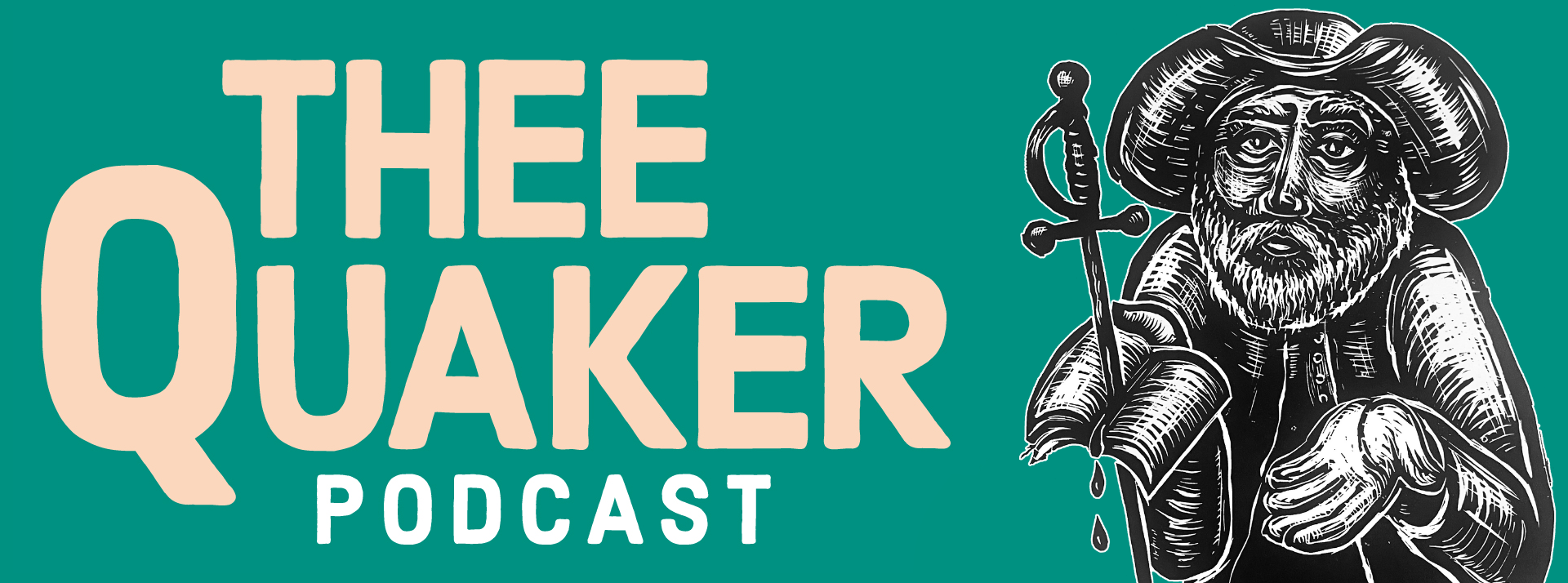

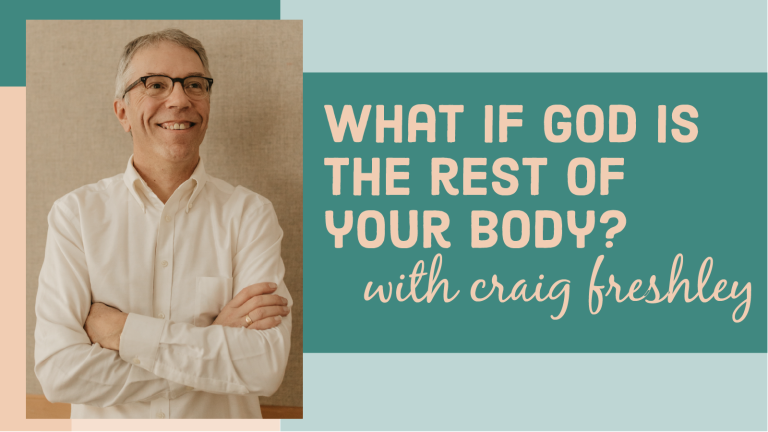
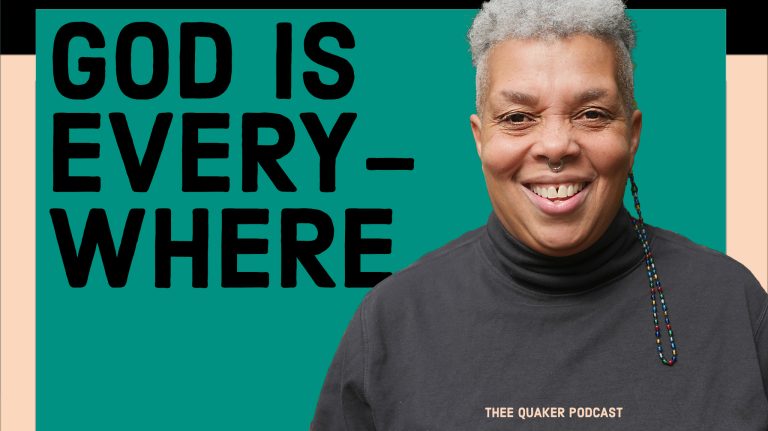
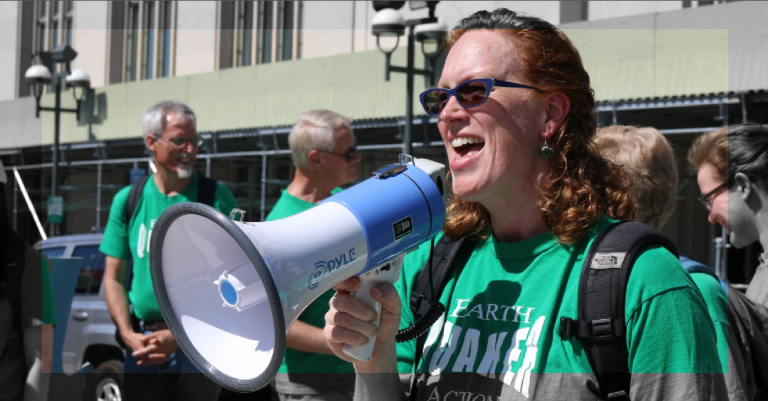
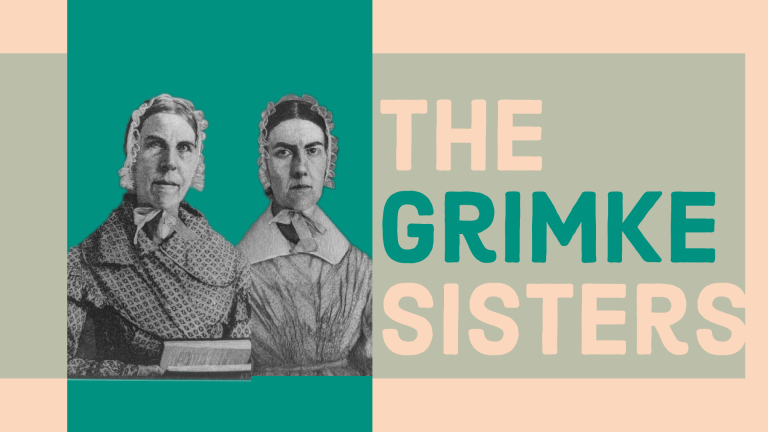
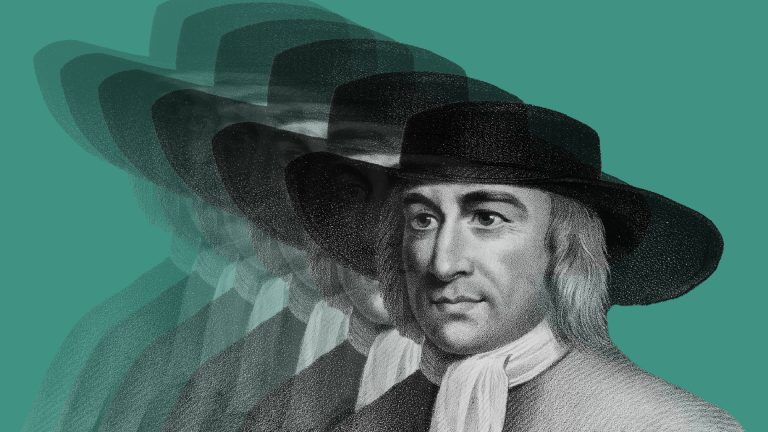
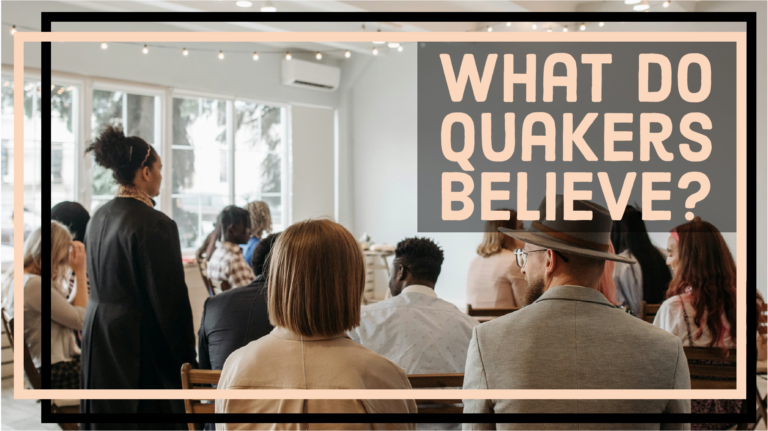
In deed we Quakers are instrument and ambassadors of resilience through our virtues of simplicity, honest and integrity.